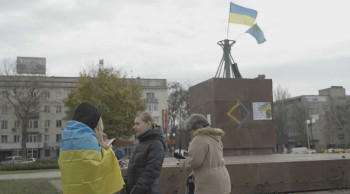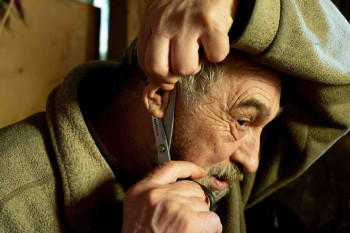Ukrainian teacher risked prison in Siberia to expose collaborators in occupied Snihurivka

SNIHURIVKA, Mykolaiv Oblast — When Russian forces seized her town, chemistry teacher Natalia Vorobiova had a choice: collaborate and be left alone or defy them and risk everything.
She chose defiance.
Even after Russia's Federal Security Service (FSB) threatened to abduct and imprison her in Siberia, she continued to refuse to teach a Russian curriculum. When some other teachers chose to work with the Russians, she tried to collect their names and turn them over to Ukrainian authorities.
Her attitude was on display on Sept. 1, the first day of the school year, when she stood in front of her school, wearing her vyshyvanka, a traditional Ukrainian embroidered shirt. The school was closed due to Russian occupation, but Vorobiova wanted to send a message.
"I am Ukraine, and I will work for Ukraine," Vorobiova recalled telling the FSB operatives who came to cajole and threaten her.
Snihurivka, a railway hub on the western bank of Inhulets River and the northern gate to Kherson, was occupied by the Russian troops on March 19, after 16 days of heavy fighting against Ukrainian forces and crowds of civilians blocking roads into the town.
Vorobiova and her fellow educators from local schools were left with an unenviable choice: continue to teach under the Russian flag or look for another job. Usually, the only other available work was selling produce at local markets.
Vorobiova, who had previously taught chemistry in two Snihurivka schools, chose the market.
Saving the Ukrainian flag
When Russian troops occupied Snihurivka, they took over both schools where Vorobiova had worked before the full-scale invasion.
One of these schools had displayed a Ukrainian flag, donated and autographed by the 28th Mechanized Brigade of Ukraine's Ground Forces. When Russian soldiers moved in, they took the flag out of its display and threw it on the floor to step on.
"I distracted a Russian soldier, grabbed the flag, and shoved it up my sleeve," Vorobiova told the Kyiv Independent.

"I do not know what was driving me," she said. When she got home, she put the flag in a glass jar and buried it in the ground among some berry bushes.
In late June, Vorobiova told a colleague she was hiding the flag.
"When two FSB operatives showed up at my place, I thought that my colleague had exposed me to the Russians," Vorobiova said.
But the Russians were there because of her other activities.
Informing on collaborators
The occupying forces had started recruiting teachers to keep the schools open. By offering promotions and other benefits, they succeeded in recruiting over a dozen teachers — in an attempt to relaunch at least one of the schools.
Vorobiova continued her resistance.
"I advised parents not to attend Russian schools," she said, showing the Kyiv Independent two Russian school advertisements that she tore down.
In the meantime, Vorobiova began putting together a list of teachers that agreed to continue working with the Russians.
In late June, she came to one of the schools where she worked before the occupation and asked her colleague to provide their names, as her list was still incomplete.
"I was told 'this is confidential information,'" Vorobiova said. She threatened to report the colleague to the headquarters of Vitaliy Kim, the governor of Mykolaiv Oblast.
Several hours later, two FSB operatives showed up at her house and started questioning her.
When one of them looked inside her phone, asking where she saved Kim's number, "that moment I realized who turned me in," Vorobiova said.
Regardless, Vorobiova said she did not hold back in front of the operatives.
"I told them how I was cursing out the Russian soldiers at the checkpoints inside the town," she recalled.
Vorobiova then admitted that she was providing the teachers' names and other information to the deputy head of the Snihurivka military administration and her former student, Ivan Kukhta.
"For transferring that kind of information, you face five years in Siberia," Vorobiova said she was told.
According to Vorobiova, seeing that intimidation doesn't work, the FSB officer tried to recruit her.
When Vorobiova said no, he leaned on the threats.
"Passing on information can be very unfortunate for you," she recalls hearing. They asked her to reconsider, giving her until Sept. 1 to comply.
Vorobiova never agreed. She was banned from coming close to the town administration building during the occupation. All four checkpoints inside Snihurivka had notices identifying her as a threat.
Closed schools
Vorobiova said that the entire staff of one of her schools refused the Russians' offers to continue working, disgusted by teachers who agreed.
Larysa Olekhova, the Ukrainian language and literature teacher in the vocational lyceum, was among those who refused the Russian demands.
"Russian soldiers had an insulting attitude towards the Ukrainian language and our territory. They kept telling us that this land is Russia, not Ukraine," Olekhova told the Kyiv Independent, standing in line at a humanitarian aid distribution point in Snihurivka.
"This will be Russia, and you will teach the Russian language," a Russian soldier told Olekhova.
"I told them I am a pensioner and can stay retired. I would never do it," Olekhova said.
Because of the fighting, the Russians in Snihurivka hadn't managed to open the schools by Sept. 1. A month later, on Oct. 1, the schools were still closed.
The Russians had scheduled the next school opening day for Dec. 4. Yet, but Ukrainian troops reached the town prior.
Locals said that almost all the Russian troops left Snihurivka on Nov. 8. Two days later, Ukraine's 131st Reconnaissance Battalion liberated the town, raising the Ukrainian flag.
At the same time, the 28th Mechanized Brigade was liberating Kherson, some 50 kilometers to the south.
"We prayed for our Armed Forces to free us, and our soldiers liberated us. Although there are difficulties, we breathe and live easier," Olekhova said.
Note from the author:
Dear reader, this is Alexander Khrebet,
Thank you for reading the story about brave Ukrainian teachers.
This is my first story from the liberated town of Snihurivka in Mykolaiv Oblast, where Russian forces committed atrocities with signs of war crimes. Another story to follow. But to continue reporting from the ground in places like Snihurivka and others, the Kyiv Independent team needs your support. Please consider supporting us by becoming our patron.











